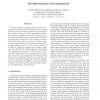Free Online Productivity Tools
i2Speak
i2Symbol
i2OCR
iTex2Img
iWeb2Print
iWeb2Shot
i2Type
iPdf2Split
iPdf2Merge
i2Bopomofo
i2Arabic
i2Style
i2Image
i2PDF
iLatex2Rtf
Sci2ools
146
Voted
HPCA
2012
IEEE
2012
IEEE
Decoupled dynamic cache segmentation
The least recently used (LRU) replacement policy performs poorly in the last-level cache (LLC) because temporal locality of memory accesses is filtered by first and second level caches. We propose a cache segmentation technique that dynamically adapts to cache access patterns by predicting the best number of not-yet-referenced and alreadyreferenced blocks in the cache. This technique is independent from the LRU policy so it can work with less expensive replacement policies. It can automatically detect when to bypass blocks to the CPU with no extra overhead. In a 2MB LLC single-core processor with a memory intensive subset of SPEC CPU 2006 benchmarks, it outperforms LRU replacement on average by 5.2% with not-recentlyused (NRU) replacement and on average by 2.2% with random replacement. The technique also complements existing shared cache partitioning techniques. Our evaluation with 10 multi-programmed workloads shows that this technique improves performance of an 8MB LLC four-core s...
Distributed And Parallel Computing | HPCA 2012 | Level Caches | Memory Accesses | Segmentation Technique |
Related Content
| Added | 24 Apr 2012 |
| Updated | 24 Apr 2012 |
| Type | Journal |
| Year | 2012 |
| Where | HPCA |
| Authors | Samira Manabi Khan, Zhe Wang, Daniel A. Jiménez |
Comments (0)

